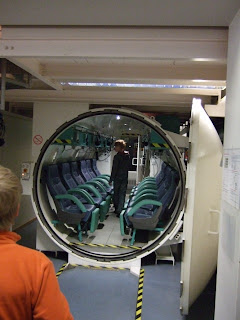A visit to the hyperbaric chamber
Last week I did a dive to -30 meters while remaining totally dry and while chatting with the other divers :).
Together with the people taking the emergency first response course and/or Rescue Diver course, we visited the recompression room at the UZA hospital in Antwerp. In this room divers who have encountered a diving accident and suffer from decompression sickness are treated but the hyperbaric oxygen treatments are also beneficial for people with sudden deafness, blindness, CO2 poisoning, non-healing problem wounds (from diabetics,...), ....
The cabin is brought under pressure higher than the normal atmospheric pressure....which is similar to what divers experience under water. If you get to breathe pure oxygen in such circumstances, it accelerates the oxygen in the body's tissues drastically, as well as an increased oxygen transport capacity of the blood vessels.
A "descent" in the recompression room requires the same pressure adjustment techniques as with diving: frequent clearing of the ears and you cannot wear any watches or devices that cannot take this type of pressure (our diving computers even had to be left in a bucket of water in the room). The "ascent" needs to be gradual and included a safety stop , ...just as we do in a real dive.
It was fun to get a lecture on the number of dive accidents treated in Antwerp per year, their causes, their treatments etc and to tour the facilities. During the dive we experimented with balloons and plastic bottles to see the anticipated volume changes. More remarkable and new to us was our voice change......we all got a very funny high pitch :p. Our funny mood could be either explained by our voice, the company or the nitrogen narcosis at high depth or a mixture of it all.
The change in room temperature (5-6°C increase during a 30 m dive) was quite remarkable as well which caused many sweaters to go off and back on again.
Anyway, it was a fun and informative evening!




Together with the people taking the emergency first response course and/or Rescue Diver course, we visited the recompression room at the UZA hospital in Antwerp. In this room divers who have encountered a diving accident and suffer from decompression sickness are treated but the hyperbaric oxygen treatments are also beneficial for people with sudden deafness, blindness, CO2 poisoning, non-healing problem wounds (from diabetics,...), ....
The cabin is brought under pressure higher than the normal atmospheric pressure....which is similar to what divers experience under water. If you get to breathe pure oxygen in such circumstances, it accelerates the oxygen in the body's tissues drastically, as well as an increased oxygen transport capacity of the blood vessels.
A "descent" in the recompression room requires the same pressure adjustment techniques as with diving: frequent clearing of the ears and you cannot wear any watches or devices that cannot take this type of pressure (our diving computers even had to be left in a bucket of water in the room). The "ascent" needs to be gradual and included a safety stop , ...just as we do in a real dive.
It was fun to get a lecture on the number of dive accidents treated in Antwerp per year, their causes, their treatments etc and to tour the facilities. During the dive we experimented with balloons and plastic bottles to see the anticipated volume changes. More remarkable and new to us was our voice change......we all got a very funny high pitch :p. Our funny mood could be either explained by our voice, the company or the nitrogen narcosis at high depth or a mixture of it all.
The change in room temperature (5-6°C increase during a 30 m dive) was quite remarkable as well which caused many sweaters to go off and back on again.
Anyway, it was a fun and informative evening!








Comments